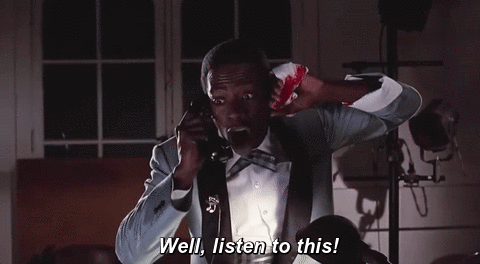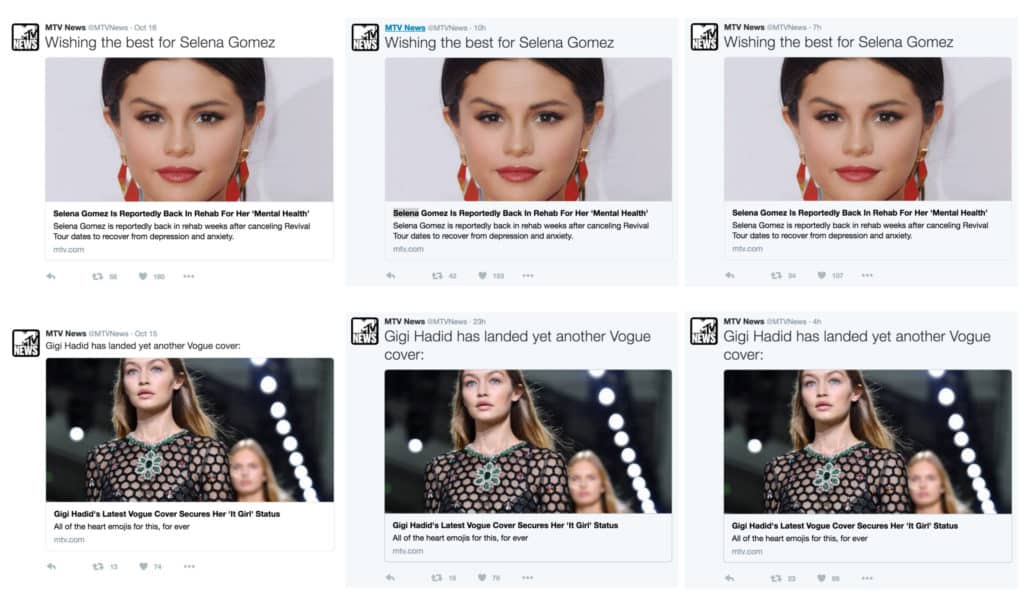Got a Facebook page? Here’s a fun little 30-second experiment.
Head over to your page and check many likes it has. You know where to look:
They should be right there – but they might not be.
In fact, they may be TOTALLY GONE.
(Bum-bum-buuuuuuum.)
Facebook has recently started experimenting with eliminating the total number of likes from pages – not deleting them, but not displaying them, either.
Facebook is now hiding/not displaying the Total Likes number on Pages pic.twitter.com/zjyf94WQbB
— Matt Navarra ⭐️ (@MattNavarra) October 21, 2016
Some users and pages may find that those likes aren’t showing up anymore – and whether or not Facebook makes this permanent, it says a lot about their attitude toward likes.
(And as history shows us, when Facebook tells you what it cares about and doesn’t care about, you should probably listen.)
So, what’s the message here? What’s Facebook really trying to tell us with this – and how should that influence what you’re doing there?
Stop thinking so much about likes
Over the past few years, Facebook has developed kind of a love/hate relationship with page likes.
They make sense in theory – you like a page, and Facebook might show you some of that page’s updates in your News Feed.
In practice, though, page likes aren’t always legit, and time and again, Facebook has had to contend with pages that’ll do anything for a virtual thumbs-up.
In 2014, for example, they had to take away the option of like-gating, or making certain content (like contests) available only to people who have liked a certain page.
They’ve also had to regularly identify and delete page likes from fake accounts, which number in the hundreds of millions.
So while page likes are supposed to serve a practical purpose, having the number you’ve gotten on permanent display makes it more of a point of pride – and pages’ efforts to drive that number higher and higher make the system less effective.
(Sure, there’s something to be said about a high number of likes indicating a brand’s popularity and trustworthiness. But if you never know how many of those likes are real, doesn’t it kind of defeat the point?)
Facebook is already under serious scrutiny for its role in spreading fraudulent content, too.
This Facebook trending story is 100% made up.
Nothing in it is true.
This post of it alone has 10k shares in the last six hours. pic.twitter.com/UpgNtMo3xZ— Ben Collins (@oneunderscore__) November 14, 2016
Between reported failures to stop the spread of fake news and recent controversy over years of falsely reporting the popularity of video, the last thing Facebook needs is more reason to have its credibility questioned.
If Facebook wants to de-emphasize the total number of likes for your page, that has big implications for your marketing strategy.
Let’s take a look at what exactly those are!
Rethinking your Facebook marketing strategy
If reaching the people who’ve liked your page is the only way you measure your success on Facebook, you’re probably going to be disappointed.
Like, really disappointed.
One study showed that in October 2016, organic reach on Facebook was less than 10% – and that was an IMPROVEMENT over the month before. That same month, pages paid for 29% of their overall reach.
(This isn’t an outlier, either. In May, pages paid for nearly 32% of their reach.)
The age-old strategy of just posting a few things on Facebook and assuming your fans will see it doesn’t work anymore.
Instead, bring these three strategies into your gameplan:
1. Pay for reach (sometimes)
Don’t worry – it’s not as scary (or as expensive) as it sounds!
Once you know how to create an audience and test your ads, spending just a few bucks here and there can go a long way.
(Here’s a quick how-to, if you’re new to all that.)
2. Share what people share
When you post something on Facebook, the network isn’t going to show it to most of your fans.
That means you’ve gotta post things that other people are going to share, so that your potential audience isn’t limited to the people who already follow you!
A 2016 study found that for the million most-shared articles on social media, 90% of all sharing took place on Facebook. Understanding what people share on Facebook and why can give you the edge you need to reach more people proactively, instead of just hoping that Facebook gives you good reach with your existing audience! Remember: it isn’t just about what your audience wants, but what your audience’s audience wants.
3. Don’t just throw the dart one time
When you’re playing darts, you only get so many points each time you hit the target.
Would you rather throw just one dart and stick with the points you get? Or would you rather throw a whole bunch of darts, and watch the points add up?
Sharing something on Facebook just one time guarantees you’re going to miss most of your audience.
Sharing it again and again over time, though, means you get repeat opportunities to reach new people.
From The New York Times and BuzzFeed to the White House, repeating your social media updates has become the new standard for effective marketing. It’s just the way social media marketing works now – which is exactly why we built a tool designed to do exactly that!
Don’t waste your time or your content by sharing it just once and assuming Facebook’s algorithm will take care of the rest for you. Give it the opportunities it deserves to find an audience!
What do you think about Facebook hiding likes?
Facebook is just testing the new look for pages that hides their number of likes – so there’s no way to tell if this change is going to become permanent for everyone!
What do you think of it, though? Does it make sense to keep that number tucked away and de-emphasized? Or is it hiding something that you feel proud of? Share your thoughts in the comments below!
Start building your social media strategy and get set up for social media success with our free course Social by Seven!







16 Comments
I still have as many likes as I had before. So I wonder, whether the information in this article is actually true?
Fortunately, Facebook is experimenting right now with hiding likes, not deleting them – and since it’s an experiment, not every Page is going to be affected right away!
Thank you for the explanation, Tom. Best regards, Charles
I don’t mind it so much as a marketer but clients still see it as a metric of success. I find that the reach metric is more pertinent. Having tons of like and very low reach is totally useless for the brand.
I absolutely believe since “likes” have defined Facebook pages so much previously that its become the norm to think more likes = popular. However, I believe and know that engagement is the true indicator of popularity.
I agree with you that the number of Facebook likes isn’t a relevant metric for the popularity of business. There are too many fake accounts and the guys from Facebook are aware of that. There is too much paid advertising on Facebook in order for it to be relevant for organic searches.
Post good content ONLY during your peak viewing time and you will grow your page regardless. It’s quality and timing. Always follow your analytics, numbers don’t lie.
I was just writing a blog post about this issue. I think it’s a good move. The quest for more and more likes/followers is part of what’s killing Twitter. Hopefully this will help people focus on quality, not quantity.
I find likes is an important metric for measuring my business growth
(since I don’t do anything to inflate them and so my likes are primarily
organic). So, as a metric I think it’s a good tool for business owners
to have access to but it doesn’t need to be public so long as it’s
available to page administrators.
Totally agreed with Heather. It’s gonna help small business and startup to compete and get trust faster.
This is good if you are a new business wanting to grow your profile. It means that you content can stand on its own 2 feet, rather than people making a judgment call on you due to the number of likes.. because like it or not – vanity metrics matter when you are looking to make a good first impression.
I think it makes sense to hide it. Especially for newer businesses who are trying to compete with the well known business in their area. It can be a bit intimidating
Totally agree with you Heather. This kinda levels the playing field.
I second that, Jay and Heather! I think between preventing scammy content and evening out the playing field, I personally see this as a move in the right direction. I also agree with what Rebecca said about it being beneficial for administrators to still have access to the likes number even if it isn’t displayed on the page. We’ll all see where FB takes it from here.
Why should it level the playing field? Some brands are older than others. Some are more popular than others. We all have to pay our dues. The biggest issue with this is that brands that make money on sponsorships and collaborating with other brands based on their demographic and numbers will be hindered from doing this or being found based on how solid and popular the brand is.